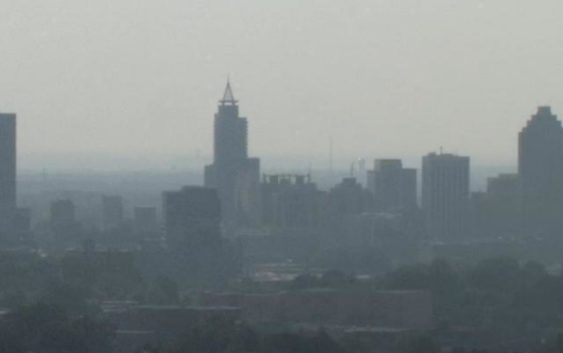- Bills introduced a year after state’s largest blaze seek to limit wildfires
- A year after Texas’ largest wildfire, Panhandle residents tugged between hope and anxiety
- Another $500M for Hurricane Helene relief in North Carolina passes key hurdle
- Crews battle wildfire in McDowell County, NC
- Wildfire in McDowell County, NC is 20% contained, officials say
'There are more opportunities for fires to get started': UNC doctor on health effects of wildfires and what you can do

RALEIGH, N.C. — With smoke making its way to North Carolina Wednesday from wildfires in Canada, it has people locally asking: What are some of the risks for us, when we are so far away from the fires themselves?
WRAL News spoke with David Peden, the Senior Associate Dean for Translational Research and Medical Director of the Center of Environmental Medicine, Asthma and Lung Biology at the University of North Carolina, to learn more about what has made these fires more dangerous and what you can do to stay healthy.
WRAL: What is causing these wildfires to happen more often?
Peden: It’s a combination of things. Climate change, which makes a forest drier, makes them more flammable. Coupled with that, there’s more human intrusion into more forested spaces. So, there are a lot of places where people live, and there are more opportunities for fires to get started.
WRAL: How far can the smoke travel?
Peden: Smoke can, as we’ve seen both a couple of weeks ago and this week, can travel hundreds if not thousands of miles away from the source of the fire itself. We are going to be seeing more of these as a result of changes in climate.
WRAL: What are some of the health risks of all the smoke?
Peden: People at especially high risk for wildfire include people with asthma. There’s some concern that children may be at higher risk. And conversely, people over the age of 65 are at higher risk. We think about wildfires with regard to respiratory tract illnesses, but actually, cardiovascular effects can also be seen. Heart attacks, strokes, that sort of thing.
WRAL: What should people in those groups consider doing?
Peden: I would say if you have a chronic illness, make sure your chronic illness is under well, good control.
If you’re in a high-risk group especially, think about having an N95 mask. There’s some data that suggests that other masks could be useful, but the clearest data that’s been used in occupational settings is the N95 mask. That will filter the particles out if you have to be outside.
WRAL: What can you do if you’re inside?
Peden: If you’re inside, keep your windows closed, and use air conditioning. If you have a device called a HEPA filter, which is an abbreviation for high-efficiency particle accumulator filter, those are commonly purchased either online or at hardware stores. Those can all help in reducing the particle load in the air.
WRAL: What size HEPA filters should people buy?
Peden: Well, the ones you put in your regular ducts, I would go for the highest efficiency of those. A HEPA filter device is actually an electric plug-in device that pumps air into it, filters the air, and then exhausts air that’s been cleaned.
WRAL: How active should people be during a wildfire alert?
Peden: When possible, try to not be as physically active as you might wish to be or normally be when there’s a wildfire alert.
The reason for that is that exercise and strenuous activity increase your respiratory rate. That effectively increases the dose of the particles that you inhale. So if you’re going to be exercising, you might want to consider doing that in a gym indoors that’s got a facility that’s air-conditioned and closed.
WRAL: What do you think governments can do?
Peden: I think policy makers, and I think levels at all levels of government really need to think about fossil fuel use with regards to forests.
Yes, more staffing to help manage the forest, but it also involves city planning. generic climate change discussion in which forests and wildfires are clearly an element of that.
Severe weather is another element of that. I mean, climate change very clearly has a result in the exaggerated heat wave that people in Texas are now experiencing. It’s anticipated that there’s going to be increases in sudden storms, whether they’re hurricanes in the hurricane alley, part of the United States and central United States, hurricanes, heavy deluge of water.
So all of those things are anticipated to happen more frequently as a result of climate change.
WRAL: What can we do, from a societal perspective?
Peden: From a societal basis, there are a number of things that we need to collectively do to address climate change issues.
We need to think more about how our transportation system, when possible, using automobiles that don’t take five different trips a day. You might consolidate your activities so you take one trip in one place, do a couple things and then move to another location. So all those things are important for us to think about as a society.
With regards to forests themselves, forest management is important and frankly professional foresters and that’s a governmental response. In the United States there’s actually a multi-agency response that including the Forest Service, the EPA, the Park Service, a variety of other federal agencies that are all involved in how we manage forests.
But, the main thing for individuals is to think about what they’re going to do in the context of wildfire including understanding when they may want to leave a particular area.